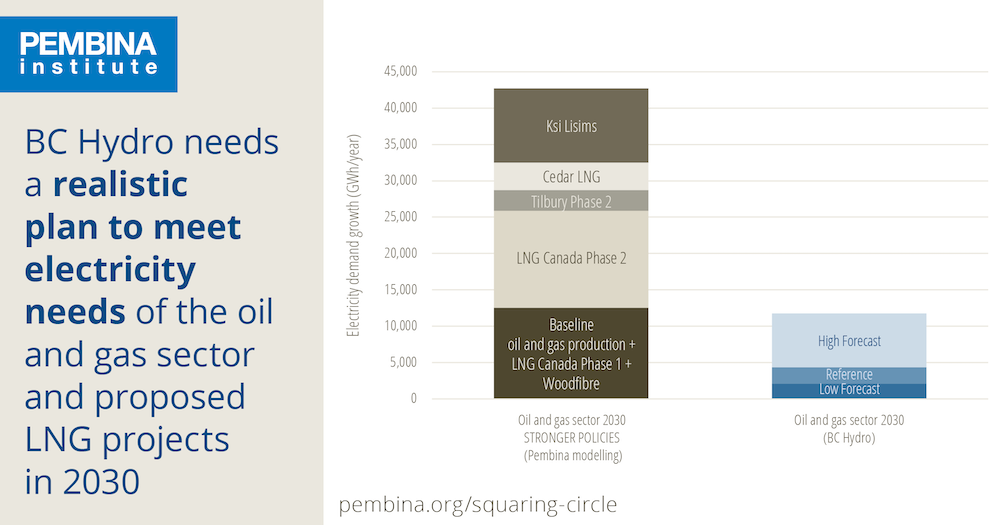VANCOUVER, B.C. — A new report from Pembina Institute finds that B.C.’s oil and gas cap is a critical policy to meeting the province’s 2030 oil and gas emissions target.
Squaring the Circle: Reconciling LNG expansion with B.C.’s climate goals analyzes the emissions that would be produced by LNG projects and pathways to meeting B.C.’s climate goals. The report finds, emissions from oil and gas production in B.C. would be at least double the government’s 2030 sector target without an oil and gas cap. Conversely, to meet B.C.’s 2030 oil and gas sector emissions target the proposed scale of LNG development would put significant pressure on the province’s clean electricity grid. This could drive away investment from growing clean industries, such as critical minerals mining and green hydrogen production, and other clean growing sectors, such as transportation and buildings.

Our findings underscore the province’s recently announced energy action framework will be critical for meeting the 2030 oil and gas sector emissions target. But meeting this target will require a large amount of new electricity.
Our analysis indicates that if only the two LNG projects on track to be built go forward, the province will need almost three times more electricity than is currently generated by B.C.’s Site C hydroelectric dam. If all proposed LNG projects are built and electrified to fit under the provincial cap, the equivalent of 8.4 Site C hydroelectric dams would be needed. This is enough electricity to supply almost 3.8 million homes.
Global demand for LNG is projected to fall this decade, as more countries transition away from fossil fuels. Conversely, demand for clean energy sources will grow. B.C. must carefully consider the availability of clean electricity when evaluating new LNG projects and how to prioritize that electricity in a way that benefits future economic growth.
The scale of proposed LNG development in B.C. presents a challenge for the province as it seeks to meet its climate targets while reconciling electricity needs across B.C.’s clean energy economy.
Quotes
Jan Gorski, Director of the Pembina Institute’s oil and gas program, and co-author of Squaring the Circle said:
“The decisions B.C. makes today can help ensure it creates a safe, prosperous future for British Columbians, by meeting its emissions reduction goals while also encouraging investment in the clean energy sectors that we know will underpin global economic growth in the decades ahead.
“The Government of B.C.’s energy action framework is a step in the right direction. It ensures emissions associated with LNG plants will be capped and cut by 2030, supporting the province’s capacity to meet its 2030 oil and gas sector target. This is especially important given the falling demand outlook for all fossil fuels – including natural gas – in this decade and beyond.
“Our analysis shows that massive amounts of electricity will be needed to ensure that LNG production fits within the province’s 2030 emissions cap target. This could discourage investment in other sectors that will also need clean electricity. The BC Hydro task force has a critical role to prioritize electricity for growing clean industries. This is especially important given the falling demand outlook for all fossil fuels – including natural gas – in this decade and beyond.”
[30]
Contact
Courtney Smith
Senior Communications Lead, Pembina Institute
647-797-9353
Background
Report: Squaring the Circle: Reconciling LNG expansion with B.C.’s climate goals
Report: Liquefied Natural Gas, Carbon Pollution, and British Columbia in 2017





